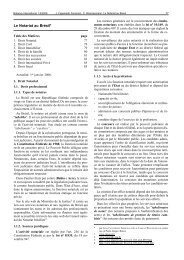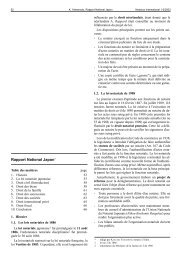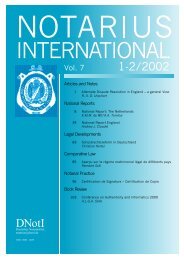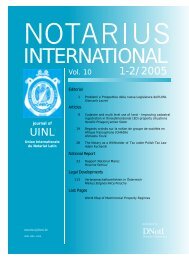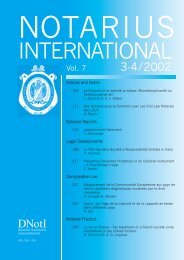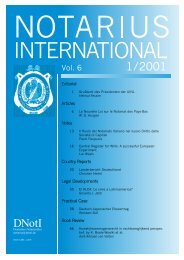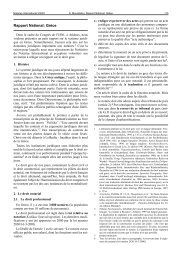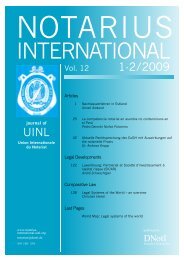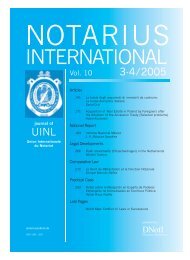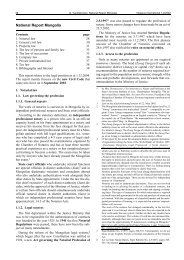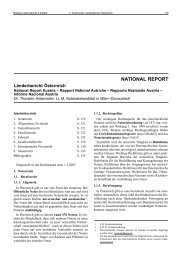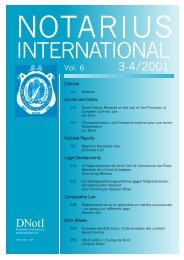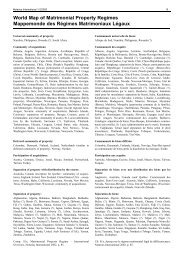National Report Mexico - Notarius International
National Report Mexico - Notarius International
National Report Mexico - Notarius International
Create successful ePaper yourself
Turn your PDF publications into a flip-book with our unique Google optimized e-Paper software.
214 J. A. Márquez González, <strong>National</strong> <strong>Report</strong> <strong>Mexico</strong> <strong>Notarius</strong> <strong>International</strong> 3-4/2005<br />
For intestate successions, in general the rule of “lex rei<br />
sitae” applies to immovables as well as to movables.<br />
Hoever, Puebla and San Luis Potosí apply the law of domicile<br />
(in the continental sense) to movables (and lex rei<br />
sitae only for immovables), Quintana Roo applies the law<br />
of domicile to both immovables and movables.<br />
6.2.2. Societies or associations (article 2736 of the<br />
CCFD)<br />
The rules of foreign private corporate bodies are respected<br />
in accordance with the law applicable to the act<br />
of their incorporation (locus regit actum rule). The recognition<br />
afforded by Mexican domestic law to the capacity<br />
of the foreign corporate body cannot exceed the recognition<br />
afforded by the country of origin and it is presumed<br />
that the representative of that foreign corporate<br />
body is, naturally, empowered to take part in any act in<br />
which possible liability may be demanded.<br />
6.2.3. Adoption (articles 410-E and 410-F of the<br />
CCFD)<br />
The law distinguishes between two types of adoptions:<br />
- adoption “instigated by citizens of another country with<br />
their habitual residence outside Mexican territory” is<br />
referred to as international adoption;<br />
- whereas adoption “instigated by citizens of another<br />
country with their permanent residence in Mexican territory”<br />
is referred to as adoption by foreign citizens.<br />
In the first of these cases, the adoption is governed by<br />
the international treaties signed by <strong>Mexico</strong>. In the second<br />
case, the provisions of the CCFD naturally apply. Finally,<br />
article 410-F adds that, when circumstances are equal,<br />
Mexican citizens will be given preference over foreign<br />
citizens.<br />
The CCFD establishes a minimum age of 25 to adopt<br />
and a minimum difference of 17 years between the person<br />
adopting and the person adopted (article 390). However,<br />
this provision is only included in the civil codes of<br />
ten federal states in the Republic. The remainder, i.e. 22<br />
civil codes, establish different ages ranging from 18 to 30<br />
for the capacity to adopt and from 10 to 20 with regard to<br />
the necessary age difference between the person adopting<br />
and the person adopted.<br />
6.2.4. Capacity of foreign citizens<br />
In accordance with the provisions contained in articles<br />
1327 and 1328 of the CCFD, foreign individuals and corporate<br />
bodies have, in general, capacity to acquire property<br />
through either testate or intestate succession, though<br />
always in accordance with the provisions contained in the<br />
PCUSM. There is only one restriction on this: possible<br />
lack of international reciprocity.<br />
6.2.5. Marital status acquired overseas<br />
The law expressly provides that the records submitted<br />
by the interested parties, in accordance with what is provided<br />
in the Code of Civil Procedure, will be sufficient in<br />
order to establish marital status acquired by Mexican citizens<br />
located overseas, provided that the act is recorded<br />
at the relevant office (article 51 of the CCFD).<br />
6.2.6. Credit instruments issued by foreign citizens<br />
Articles 252-258 of the General Law on Credit Instruments<br />
and Operations state that the capacity to issue credit<br />
instruments overseas or carry out any of the acts contained<br />
therein will be established in accordance with the<br />
law of the country in which the document is issued or the<br />
act is carried out and that Mexican law on capacity will<br />
apply. That same law will govern the capacity of foreign<br />
citizens to issue instruments or carry out any of the acts<br />
contained therein in the territory of the Republic.<br />
6.3. Documents from foreign countries<br />
Articles 139-140 of the notarial law of the Federal District<br />
contemplate the protocolisation of documents of this<br />
type once they have been legalized or stamped with the<br />
apostille and translated, as appropriate, at the request of<br />
the interested party and without any need for a court order,<br />
except in the case of powers of attorney executed before<br />
Mexican consuls.<br />
Article 140 of the notarial law of the Federal District<br />
states as follows: “Powers of attorney executed outside of<br />
the Republic, when they have been legalized or stamped<br />
with the apostille and translated, as appropriate, by an expert,<br />
must be protocolised in order to take effect pursuant<br />
to the law. This does not apply to powers of attorney executed<br />
before Mexican consuls.”<br />
Article 121 of the PCUSM, referred to above, is applicable<br />
at an inter-state level and articles 130-131 of the<br />
Federal Code of Civil Procedure also reproduce these<br />
same provisions.<br />
The states of Aguascalientes, Baja California, Campeche,<br />
Guerrero, Nuevo León, Oaxaca (except in powers<br />
of attorney), Tabasco, Tamaulipas, Tlaxcala and Yucatán<br />
(10 federal states) require an express court order for<br />
protocolisation.<br />
At the other extreme, many states (Baja California Sur,<br />
Chiapas, Chihuahua, Durango, Estado de México, Hidalgo,<br />
Morelos, Nayarit, Veracruz, Quintana Roo, San Luis<br />
Potosí, Sinaloa and Zacatecas) no longer require any<br />
court order whatsoever and only contemplate entry in<br />
record after legalization before the notary appointed by the<br />
parties and translation by an official expert, as appropriate.<br />
In several cases (for example, the Federal District, Estado<br />
de México, Nayarit, Quintana Roo and Sinaloa) it is<br />
expressly stated that protocolisation may take place without<br />
any need for a court order or judicial writ. Estado<br />
de México adds that such protocolisation will take place<br />
by means of the statement by the notary contained in the<br />
instrument that it does not contain any provisions contrary<br />
to law, morality or good conduct. For its part, the notarial<br />
law of the state of Jalisco authorises the issue of<br />
wills in two languages in parallel columns (article 127).<br />
To conclude, the current trend with regard to the problem<br />
of validity of documents from foreign countries appears<br />
to point in the direction of abandoning the require-



